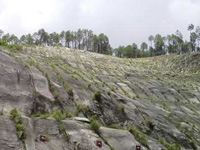To save the planet, first save elephants
Wiping out all of Africa’s elephants could accelerate Earth’s climate crisis by allowing 7% more damaging greenhouse gases into the atmosphere, scientists say. But conserving forest elephants may reverse
Wiping out all of Africa’s elephants could accelerate Earth’s climate crisis by allowing 7% more damaging greenhouse gases into the atmosphere, scientists say. But conserving forest elephants may reverse
Despite promises by many big companies that produce, trade and use palm oil to clean up their supply chains, complaints are still pouring in over the conversion of forests into plantations from West Africa

In a breakthrough discovery, scientists have revealed a new method which could lead to cheap, efficient metal-based solar cells. Scientists from Rice's Laboratory for Nanophotonics described a new method
Retired Nasa scientist James Hansen who first rang the climate alarm bell in 1988, is now back with a study that points to major sea level rise in the next 50 years owing to speeding up of glacier melt.
NIGERIAN scientists led by the President of Nigerian Academy of Science (NAS), Prof. Oyewale Tomori, and National Coordinator, National Malaria Elimination Programme (NMEP), Dr. Nnenna Ezeigwe, have hailed

Exercise And Healthy Diet Can Help In Prevention You may soon be able to run a simple blood test to know if you are predisposed to diabetes. And with the right lifestyle changes, you can delay or prevent
Using four years’ worth of data from the Kepler space telescope, researchers announce the new exoplanet along with 12 possible ‘habitable’ others Scientists on the hunt for extraterrestrial life have
FUZHOU - Scientists from China, Sweden and the United States have developed a high-yielding rice that can reduce methane emissions, a major greenhouse gas blamed for global warming, from paddies. By inserting

Rocks, boulders and mud debris falling from Varunavat Parvat over the Tambakhani Tunnel shocked Mamta (5), a resident of the Gyansu area in Uttarkashi, as she woke up around midnight a few days ago.

If the world warms up by 4°C, there is a 30 per cent probability that temperatures will be so high that even a moderate outdoor work cannot be carried out during the hottest month in North India, a study
Taking a lead, India is working on an ambitious project with scientists, geophysicists, and seismologists of 27 countries to develop an early-warning system for "prediction" of earthquake. The warning